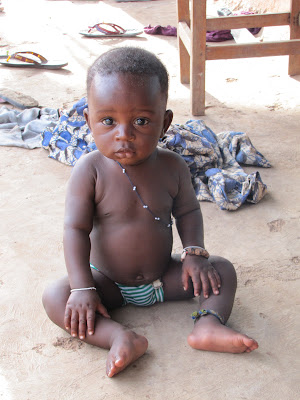A mostly universal characteristic of Peace Corps Volunteers is that we are
imbued with, and often exude, a strain of idealism. Our idealism varies in direction and scope
from person to person but, by and large, we are all inherently optimistic about
something. We think we can change the world, or at least a small corner of
it. That is why we choose to join the
Peace Corps, and why many of us stick with it.
What many people do not realize, upon joining the Peace Corps, is how
much the experience will change them.
Sure, many people think that the Peace Corps experience will help them
develop, discover, or hone new skills and aptitudes. And this is definitely true. One thing that
new Volunteers rarely realize, however, is how much they have to sacrifice to
be Volunteers.
There is, of course, the well-publicized, and, by now, clichéd, list of
creature comforts that many Volunteers do without during their services—hot
water, running water, clean water, electricity, paved roads, cell phone
service, cheese, personal space, pizza, sushi, air-conditioning, privacy, ice
cream, etc. These are what people
expect, and anticipate, to give up. No,
what I am talking about are the true costs of Peace Corps service.
There have been something like 200,000 Peace Corps Volunteers since the
organization’s inception. To date, about
290 Volunteers have died during their services.
Stuff like disease, accidents, murder have claimed the lives something
like 7 Volunteers since I swore in. It is not something we think about a lot—even
taking the malaria meds that save many of us becomes second nature—but there
are inherent risks in being a Volunteer.
A not-insubstantial number of Volunteers develop with long-term health
problems as a result of their services.
I know two people who have developed chronic headaches since coming to
Togo, likely as a result of viruses.
Other Volunteers have long-term stomach problems when they get back to
the States. I am likely typing this with
malaria and blood flukes kicking it in my system. Hopefully nothing else at the moment. I have been one of the healthiest Volunteers
that I know, either by luck or design.
These are, however, the risks that we signed up for when we took this
job. They are risks that Peace Corps
spends a lot of time and money educating us about and trying to minimize.
No, the untold sacrifice that many Volunteers make is that they give up
their homes for two years or more.
Often, when they come back, they find that home has unalterably
changed. Last week, for example, D got a
call from her mother telling her that her great-uncle died unexpectedly. He was suddenly hospitalized the previous
week, and seemed to be improving, and then abruptly died. D was really close to her uncle. He was one of those people who inspired other
people to do great and wonderful things. His death was tragic not only in its
abruptness, but also in the void that it left in her life. A Volunteer from the 2011 stage left when her
mother died suddenly. A Volunteer left
here in 2010; his father died a couple weeks after he got home. Just a few days ago, a Volunteer here got a
call that her brother had suddenly died.
Grief is bad enough when a loved one dies and you are there. You can, hopefully,
be with the person, attend the funeral, have closure, and grieve with family
and friends. There is little solace to
be found in a static-filled trans-Atlantic phone call nor in the bare concrete
walls of your house at midnight when you alone with mountain of grief piled in
your chest, when there is no comfort to be found in a sleeping world. Grief is infinitely compounded by the
knowledge that you could have been
there but, instead, you chose to be
Africa. Who would choose a month in village over a minute to say goodbye to a
loved one? Peace Corps service
necessitates not seeing your loved ones for extended periods of time; the
unspoken aspect to this is that you likely will not be there to say goodbye to
them as well. Even when return is a mere
couple of flights away. That knowledge just makes it worse.
Beyond deaths in the family, home is never the same place it was when we
left. 2 years or more have gone by. That is time that we have spent here that we
did not spend with our families and friends.
None of us are the same people we were when one of us climbed on a plane
to sail out into the unknown. To
paraphrase Frodo, we can never really go back. We have changed. Home has
changed. Maybe even the definition of “home”
has changed. It is, I think, telling that Volunteers approaching the end of
their services coordinate their departure dates so that they can be back in the
States in time for a family function.
Ive written a lot in this blog about living here face to face with the
reality of the transitory nature of life.
I had not viewed life in the States as also being transitory. I think this was deliberate. Humans are programmed to live in the here and
now. If not, we would go extinct as a
species in a spasm of insanity. I
certainly would have. Even now, as I
begin to think of life after Peace Corps, I am painfully aware of the fact
that, not only am I different than when I left, but the way I remember relating
to the States is no longer valid. It is
three years out of date. Home, or my
perception of it, was not something I expected to sacrifice when I came to
Africa. However, my sacrifice is a lot
less than that of many Volunteers. In
this, I am lucky.


